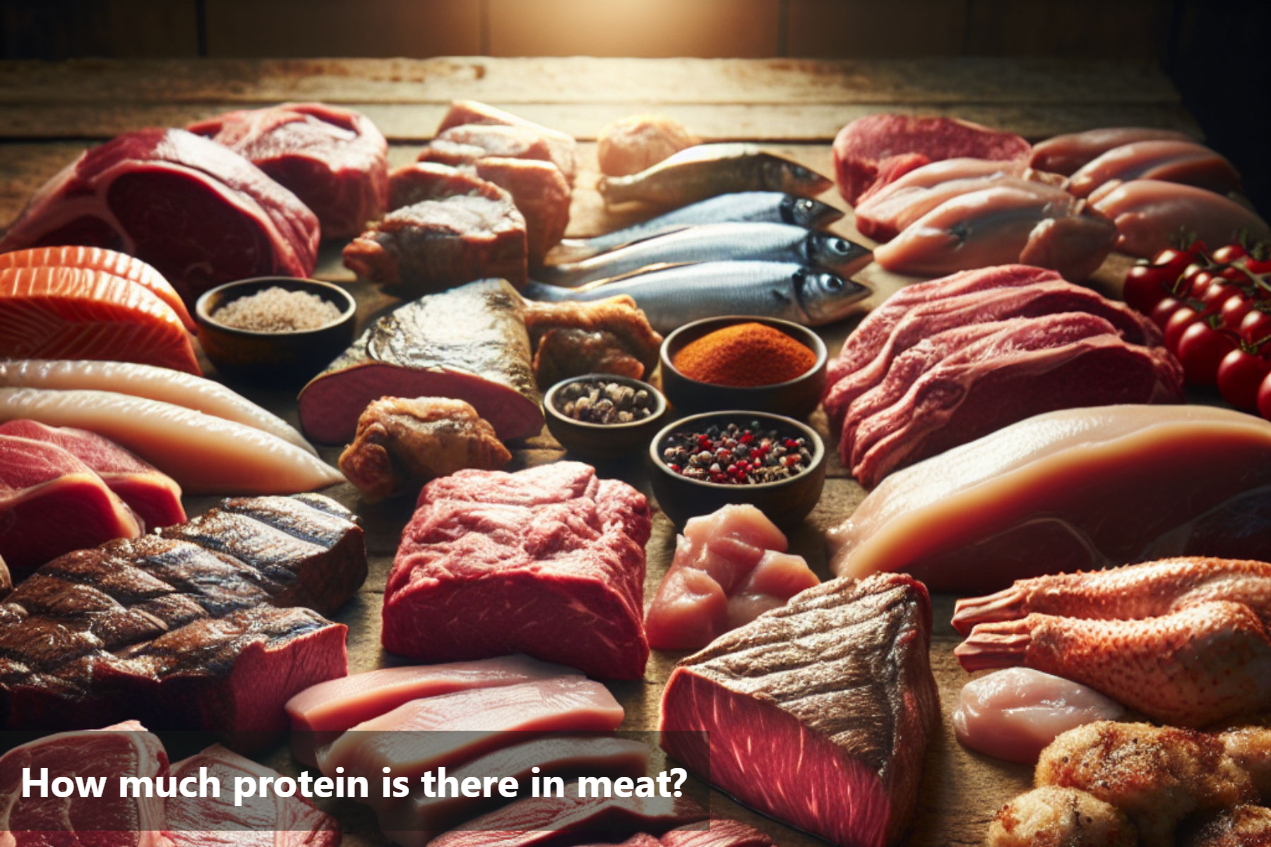
How much protein is there in meat?
Protein is a crucial component of a balanced diet, playing a vital role in various bodily functions. When it comes to meat, protein is a prominent nutrient. Different types of meat such as beef, chicken, pork, and lamb are rich sources of protein. Understanding the protein content in meat is valuable for individuals looking to maintain a healthy diet and lifestyle.
Exploring the protein content in meat can help individuals make informed choices about their dietary preferences and requirements. Knowing how much protein is present in different types of meat allows for a better understanding of nutritional intake and can guide meal planning for a balanced diet.

Nutrient content
3.5-ounce (100-gram) serving of broiled, ground beef with 10% fat content provides:
Calories |
217 |
Water |
61% |
Protein |
26.1 grams |
Carbs |
0 grams |
Sugar |
0 grams |
Fiber |
0 grams |
Fat |
11.8 grams |
Protein in Different Types of Meat
Protein content in various types of meat varies, making it essential to understand the differences when choosing sources of protein for your diet. Beef is known for its rich protein content, with an average of 25 grams per 3-ounce serving.
In comparison, chicken, a popular lean meat choice, provides about 27 grams of protein in a similar serving size, making it slightly higher than beef.
Pork offers around 22 grams of protein per serving and is a versatile option for different dishes.
On the other hand, lamb contains approximately 23 grams of protein per serving, slightly lower than chicken but still a substantial amount.
Considering the protein levels in these meats, individuals can select based on their dietary preferences and nutritional needs. For those looking to increase protein intake, chicken might be a preferred choice due to its higher protein content. However, beef remains a classic protein source for many, offering a significant amount of protein despite slightly lower levels than chicken. Pork and lamb also contribute substantially to protein intake and can be included in a well-rounded diet to fulfill nutritional requirements. Understanding the protein content in different types of meat empowers individuals to make informed choices for a balanced diet rich in essential nutrients.
Factors Affecting Protein Levels in Meat
When it comes to the protein content in meat, several factors play a crucial role in determining the nutritional value it offers.
One of the primary influencing factors is the animal's diet. Animals that are fed a balanced and protein-rich diet tend to produce meat with higher protein content. For example, grass-fed beef is known to have a higher protein content compared to grain-fed beef due to the difference in the animals' diets.
Additionally, the breed of the animal can also impact the protein levels in meat. Certain breeds are genetically predisposed to have higher muscle mass, resulting in meat cuts that are naturally richer in protein. This highlights the importance of considering the breed of the animal when evaluating the protein content of meat products.
Moreover, processing methods can also affect the protein levels in meat. Certain processing techniques, such as curing or smoking, can lead to a concentration of proteins in the final product. On the other hand, overcooking meat may result in protein denaturation, reducing its overall protein content.
By understanding these factors that influence protein levels in meat, consumers can make informed choices about their protein intake and appreciate the nutritional variations that different meats offer.
Health Implications of Eating Protein-Rich Meat
Protein-rich meat offers several significant health benefits, making it a valuable addition to a balanced diet.
Adequate protein intake plays a crucial role in supporting muscle growth and repair.
When focusing on consuming beef, chicken, pork, or lamb, body receives the necessary protein to maintain muscle strength.
Additionally, including protein-rich meats in the meals helps with weight management by increasing feelings of fullness and reducing overall calorie intake.
Moreover, protein in meat contributes to overall well-being by supporting various bodily functions and providing essential amino acids.
However, it is essential to be mindful of the drawbacks of consuming protein-rich meat, especially for individuals with specific health conditions like kidney disease. Excessive protein intake may strain the kidneys, so moderation is key for those with such medical concerns.
Incorporating protein-rich meat into my diet enhances muscle development, aids in weight maintenance, and promotes overall health.

Meat Protein Assessment
Understanding how much protein is present in different meats is crucial for maintaining a well-rounded and balanced diet. Protein is a vital nutrient that plays a fundamental role in the growth and repair of tissues in our bodies. Meat serves as a rich source of high-quality protein, essential for muscle development, weight management, and overall health. Incorporating protein-rich meat into your diet can contribute significantly to your overall well-being and fitness goals.
It is clear that making informed choices about the types of meat you consume can have a direct impact on your nutritional intake. Whether you prefer beef, chicken, pork, or lamb, being aware of the protein levels in each can help you make better dietary decisions.
The next time you sit down for a meal, remember the importance of protein in meat and how it can positively influence your health and fitness journey. Make conscious choices that align with your nutritional needs and goals for a balanced and nourishing diet.
This Blog post is an initiative by Lo! Foods, to provide accurate and Nutritionist / Doctor approved information related to Health. Lo! Foods is India's leading brand for Everyday Functional Foods. Foods designed for specific Health conditions or Needs. Lo! Foods also runs India's largest range of Low Carb Healthy Cloud Kitchens, under the brand names of Lo!, ProteinChef, ATH (All Things Healthy) and DiabeSmart.











Leave a comment
Your email address will not be published.